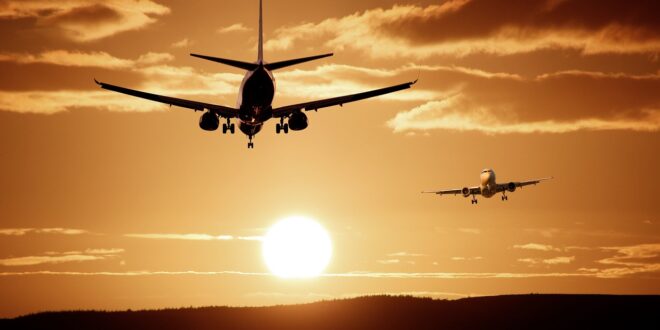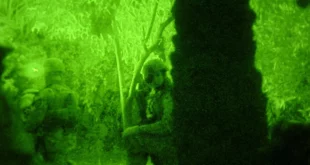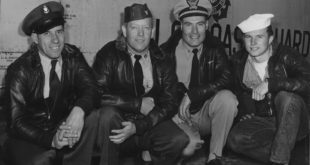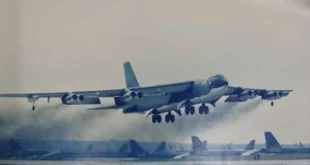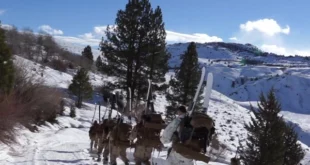We were leaning over the throttles, breaking the seals on our masks, and yelling at each other.
by Mitchell “Taco” Bell
To all my passenger friends out there who always text me with the crazy pilot questions, I can assure you as pilots we train for this stuff all the time and currently one of the exercises we work with in the simulators is a “Rapid D” from 36,000 feet.
It doesn’t happen very often and I guess I won the lotto ticket, as I experienced a real life Rapid Depressurization while flying the MD-80 (the S80) back in 2004 or so.
We had just climbed up to 35,000 feet, heading south to Mexico from Dallas/Ft. Worth in the cruise mode. The captain pulls out his Subway sub and makes a big show of it. I had refused to exit the airport and have to deal with the new Nazi TSA screeners in order to go with him. So now I’m getting a bit hungry watching him smack his lips as he was eating.
READ MORE from Mitch “Taco” Bell: Attacked by Lasers: An Airline Pilot Encounters a Dangerous Game Over Mexico
The S80 is a VERY quiet plane at cruise compared to the loud 737 or 727 cockpits. We had our little molded plastic ear pieces hanging up and the overhead speaker on. Inside the cockpit, the S80 had a gasper vent about eye level to your head. Without warning, the air blowing just stopped.
I say something like, “That’s weird,” and notice both packs (the air cycle machines that produce the pressurization from engine-bleed air) have stopped. I reset them with no joy.
Looking over next to the pack switches I see the gauge for our cabin altitude. Without warning it was rapidly climbing. At 35,000 feet most airplanes except for the 787, cruise around at 8,000 feet pressure. Imagine being in Denver and on top of a mountain, another 2,000 feet up.
It didn’t take long for the cabin to exceed 10,000 feet pressure, setting off the warning horn we only hear in training. Our cabin pressure had failed, and it was happening fast. At this rate, the masks in the back would be dropping in only a few moments.
“Mask Mask Mask!” I yelled. I reached up to grab mine hanging to my right. The captain, holding a foot long Spicy Italian sub, was torn for a second and then threw it into his kitbag and donned his mask. Later, It took him hours to clean out all the lettuce and stuff that went everywhere inside his bag.
This is where you get the adrenaline dump! My captain, having recently upgraded from the 767, treated this like it was over the tracks on his way to England. He dialed 10,000 in the window, and rolled 30 degrees off heading. He hit the IAS Button like the Level Change on a B737 so the plane would start to descend, and ran the airspeed up as he pulled the throttles back and extended the speed brakes (to kill the lift on the wings).
I closed the outflow valve and manually ran the wheel to seal it, found the warning horn button to silence the noise, and made a radio call in the blind.
“Mayday Mayday Mayday, American XXXX going to 10K with a rapid-D, clear all airspace out below us,” I called. Followed by working the checklist.
Here is what they don’t discuss in training that I bring up all the time. Masks-on is the first step on the checklist, as you can pass out fast. The second is crew communication. How do you do that?
Nine out of 10 crews say, “I’d turn the overhead speaker on.” Here is the problem with that. The seals in both windows deflate, which creates this gap around the window and all the cabin exit doors, too. The shrieking of the wind coming into the flight deck is -40c, ice cold, and LOUD. Cranking the volume on the overspeaker made everything sound like Charlie Brown’s teacher talking.
We were leaning over the throttles, breaking the seal on our masks and yelling at each other. This is why I tell crews as an option remove your headset over your neck and put your mask on and then replace your headset. Now you have both ears covered and noise canceling headsets helping you out so you can hear.
Of course take the hot mic switch off so you don’t sound like Darth Vader, and use the bottom rocker switch on the yoke to talk to your partner, and the windshield mic switch to talk to Air Traffic Control, passengers, and flight attendants.
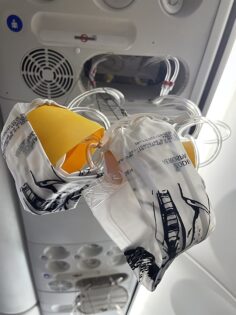
While we were flying the plane, all the masks dropped in the back (what we call the rubber jungle). A lady got loopy and argumentative as she was trying to put that rubber cup over her lapdog’s muzzle, and didn’t put one on herself. The flight attendant had a walkaround bottle strapped to her as she checked the cabin. The lady finally got her mask on. Remember they say, put it on yourself first and then your child. Guess she forgot that.
When you pull the hose, it activates a 12-minute bottle that chemically creates O2 for you to breathe. The flight attendants said that chest high in the cabin it was hot as hell from all the little generators going off, but from chest down freezing cold as the wind blew in from outside at around -40c.
It took us roughly eight minutes from altitude to landing straight into San Antonio.
On the ground, they asked if we would continue on. The captain and I we were both still on the rush from the adrenaline, so we said yes. So they stole the 80 at the next gate over.
The Captain made a great announcement standing in front of the passengers when we got to the gate. It’s one of the reasons I do the same to this day. He went back there and he got on the PA and he told everybody, look, you guys have experienced a once in a lifetime event. You handled it superbly. He told them, if you choose not to continue with us we completely understand. But also know that your chances of ever having anything like that happen to you again, is astronomical; like, nil.
He told them, we got a great airplane next door. He said he looked the records over, and would love to have everyone on board.
Every single person got on the airplane. Even after having gone through all that, they all got on the airplane.
Anyway, in over 30 years of flying, that is the only time this has happened, so you can rest assured it is survivable, and we train to get you on the ground fast. If it does, buy a lotto ticket when you land, as you have the odds on your side!
Mitch “Taco” Bell is a retired Marine KC-130 pilot flying for a major airline on the B-737. You can watch his Tall Tales with Taco Bell on Facebook and YouTube.
 Soldier of Fortune Magazine The Journal of Professional Adventurers
Soldier of Fortune Magazine The Journal of Professional Adventurers


